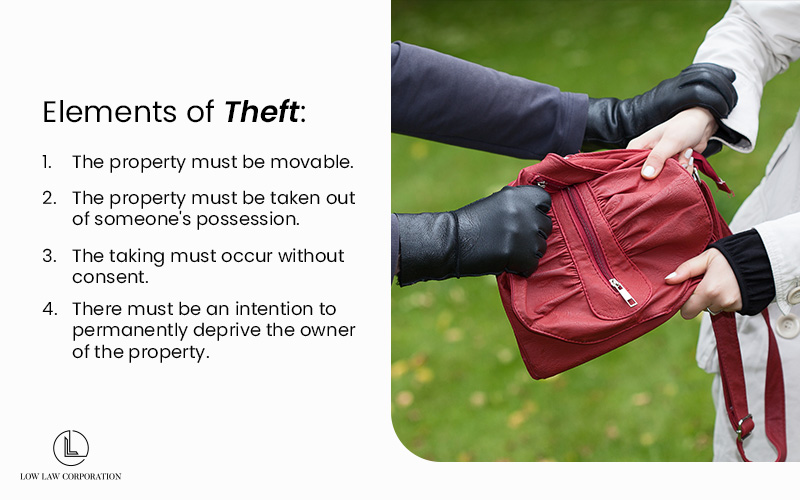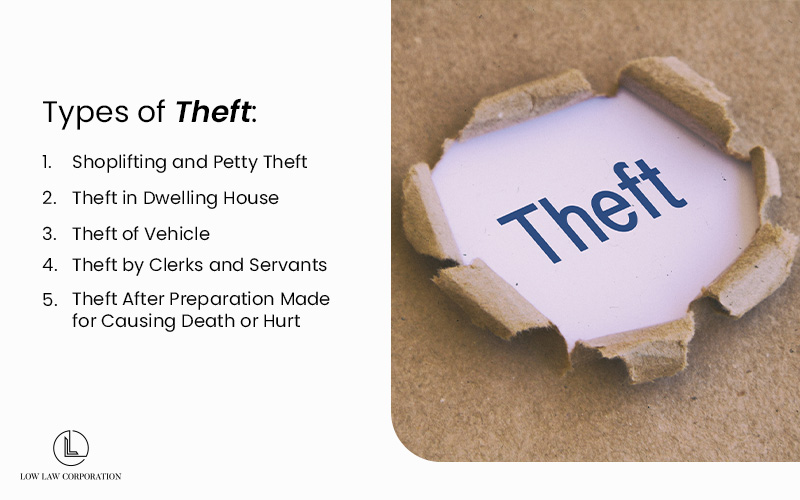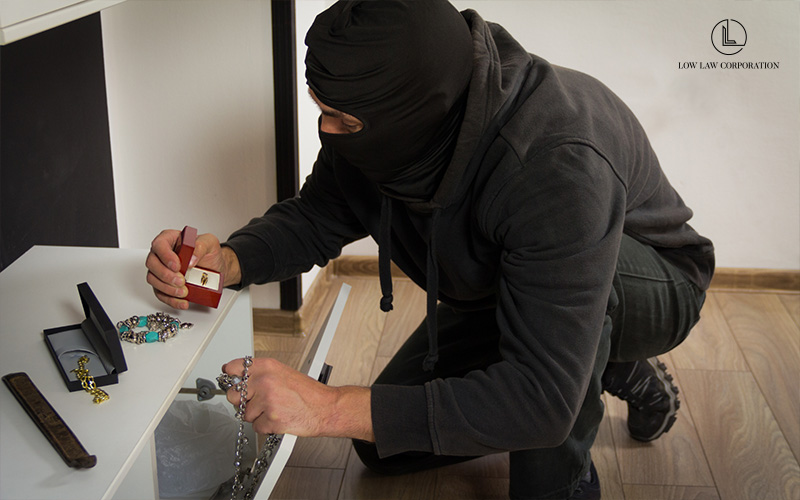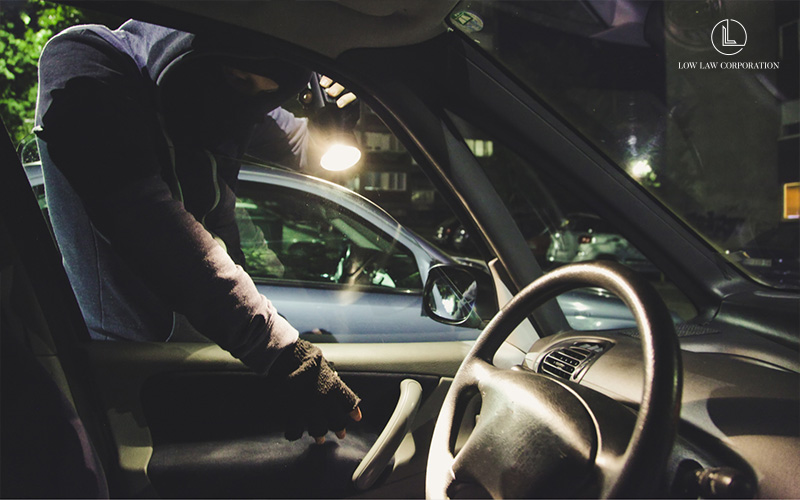Understanding Theft and Theft in Dwellings in Singapore

Theft is a criminal offence that disrupts the safety and security of individuals and their property. In Singapore, it is defined under Section 378 of the Penal Code as below:
“Whoever, intending to take dishonestly any movable property out of the possession of any person without that person’s consent, moves that property in order to such taking, is said to commit theft.”
The Penal Code carefully categorises theft-related offences, ranging from minor pilfering to more serious crimes, such as criminal misappropriation and wrongful property loss. The severity of each offence is addressed with corresponding punishments, which are proportionate to the crime’s nature and impact. It is also important to recognise the distinction between general theft and theft in dwellings, where the latter carries harsher penalties due to the invasion of personal privacy and security.
This article will explore the key aspects of theft under Singapore’s legislation, shedding light on these offences and their legal repercussions.
An Overview of Theft
Key Elements of Theft
To understand what constitutes theft, it is essential to look at the key components under the Theft Penal Code in Singapore. Each of them determines whether an act can be legally classified as theft.
1. Property
Property, as outlined in Section 29 of the Penal Code, encompasses both movable and immovable assets. However, for the purposes of theft, only movable property is relevant. This includes any property that can be physically moved, excluding land or items permanently affixed to it. Notably, recent amendments to the Penal Code have broadened the scope of movable property to cover virtual currencies and other intangible assets. The key is to protect modern forms of value under theft laws, reflecting the evolving nature of the economy and technology.
2. Possession
Theft is an offence against possession rather than ownership. This is made clear in Section 378 of the Penal Code. To illustrate, if a man places his wallet on a hawker centre table, the wallet remains in his possession despite not being in his physical control at that moment. Similarly, in cases where a person misplaces an item, such as a watch lost overseas years ago, the item would no longer be considered in their possession. Therefore, possession in the context of theft means having control or authority over an item, even if it is not physically held.
3. Dishonesty
As explained in Sections 23 and 24 of the Penal Code, dishonesty involves either causing a wrongful gain or a wrongful loss. Wrongful gain refers to obtaining property by unlawful means to which the person is not legally entitled. On the other hand, wrongful loss means the risk of losing property that a person has a legal right to possess. In short, the offender must either intend to cause such gain or loss or act in a way that is regarded dishonest by reasonable and honest standards.
4. Consent
Section 378 of the Penal Code, specifically Explanation 5, stipulates that consent may be either expressed or implied. It can come from the person in possession of the property or someone with the authority to give permission. If a person willingly consents to another individual taking their property, theft cannot be established.
5. Elements of Theft
The presence of the following elements qualifies an act as theft in Singapore:

- The property must be movable.
- The property must be taken out of someone’s possession.
- The taking must occur without consent.
- The offender must intend to permanently deprive the owner of their property, causing wrongful gain to themselves or wrongful loss to the owner.
Legal Framework of Theft Cases in Singapore
The legal framework governing theft cases in Singapore is extensive. In this section, we will identify various forms of theft and the potential legal consequences.

1. Shoplifting and Petty Theft
Shoplifting, commonly known as shop theft, is the act of taking goods from a retail establishment without paying for them. The consequences of shoplifting in Singapore include criminal charges that may lead to a criminal record, potentially hindering the offender’s future employment prospects and impacting their personal reputation. Moreover, retail establishments often implement civil recovery measures to seek repayment for the losses incurred. This further complicates the consequences for the offender.

2. Theft in Dwelling House
Under Section 380 of the Penal Code, strict penalties are imposed for theft committed in any building, tent, or vessel that serves as a dwelling or is used for storing property. Apart from a prison sentence of up to seven years, offenders may also be liable for fines. This provision highlights the severity of invading personal spaces and undermining individual security.

3. Theft of Vehicle
Section 379A outlines the theft of motor vehicles or their component parts. Individuals found guilty of this offence may face imprisonment for up to seven years, along with potential fines. Furthermore, upon release from imprisonment, offenders will be disqualified from holding or obtaining a driving licence for a duration determined by the court.

4. Theft by Clerks and Servants
Section 381 addresses theft committed by clerks or servants concerning property in the possession of their employer or master. Those found guilty of such crimes may be sentenced to a maximum of 7 years in prison, in addition to facing fines.

5. Theft After Preparation Made for Causing Death or Hurt
Section 382 states a particularly severe form of theft in which the offender prepares to inflict death, bodily harm, or restraint while committing the crime. Those convicted under this provision may be subject to a penalty of up to 10 years of imprisonment and at least three strokes of caning.

Statistics and Trends
Theft not only affects both individuals and businesses but also presents ongoing challenges for law enforcement and community safety. Understanding theft statistics and trends in 2023 can help inform effective prevention strategies and enhance public awareness.
1. Shop Theft
In 2023, shop theft emerged as the most prevalent physical crime in Singapore, with incidents surging by 21.4% to reach a total of 3,939 cases. This alarming statistic accounts for 19.7% of all reported physical crimes in the country. The majority of these thefts occurred in familiar environments such as department stores, supermarkets, pharmacies, and convenience stores.
In response to the increasing shop theft cases, the Singapore Police Force (SPF) has ramped up public engagement initiatives aimed at educating the community about crime prevention. These initiatives include:
- School Talks
Conducting educational sessions in schools to raise awareness among students.
- Youth Programmes
Implementing targeted programmes that engage young people in discussions about crime and its repercussions.
- The “Coffee with a Cop” Platform
A community engagement initiative that fosters relationships between police officers and residents.
- Collaborative Crime Prevention
The National Crime Prevention Council (NCPC) is actively involved in combating theft in Singapore through collaboration with Crime Prevention Ambassadors. These ambassadors are tasked with educating vulnerable groups, particularly the elderly, by providing information in their native languages.
2. Theft in Dwellings
In contrast to the rising trend of shop theft, theft cases within dwellings saw a slight decrease of 2% in 2023, totalling 1,695 cases. This figure represents 8.5% of all reported physical crimes. Most thefts in this category occurred in residential and commercial properties. They were often committed by individuals known to the victims, such as tenants, family members, or acquaintances.
This reduction suggests a potential improvement in community vigilance and preventive measures. However, the involvement of known individuals indicates the need for ongoing awareness about personal security and trust.
Dealing with False Theft Accusations
What to do When You Are Falsely Accused of Theft
When facing accusations of theft, it’s vital to approach the situation cautiously to prevent further complications. Here are some essential steps you should consider taking:
1. Stay Calm and Composed
It is natural to feel anxious or upset when accused of a crime, but remaining calm and composed is of utmost importance. Reacting impulsively or emotionally may escalate the situation. Avoid arguing with law enforcement or trying to explain or justify your actions on the spot. Remember, statements made in the heat of the moment might be used against you later.
Key Tip: Don’t attempt to talk yourself out of the charges or offer explanations. Instead, focus on staying calm and cooperative without admitting guilt.
2. Hire a Criminal Lawyer
Seeking legal advice from a qualified criminal lawyer attorney for false theft accusations adds credibility to your case in court. These professionals not only understand the intricacies of theft cases but can also build a strong defence on your behalf. On top of that, they aid in negotiating potential plea deals or reduced charges based on the specifics of your situation.
3. Gather Evidence
Once you’ve hired legal representation, work with your attorney to gather evidence that supports your defence. Here’s what you can do to assist your attorney:
- Establish an alibi by proving where you were at the time of the alleged incident.
- Check your phone calls, messages, or other communication records on the day in question.
- Think of people who were with you or can vouch for your actions at the time. Witnesses’ testimony could play a crucial role in your defence.
- Collecting relevant evidence can build a stronger case for your innocence or, at the very least, help reduce the severity of the charges.
4. Reserve Your Rights
Always bear in mind that your most fundamental right is the right to remain silent. You are not required to answer any police questions without your lawyer present. Anything you say during questioning can, and likely will, be used against you in court.
Should You Plead Guilty if You’re Innocent?
Deciding whether to plead guilty, even if you are innocent, is a complicated decision that is best made with the guidance of your lawyer. Convictions can occur based solely on the complainant’s testimony, especially in cases where there is insufficient supporting evidence or eyewitnesses to refute the claims. If you receive a lenient plea deal in exchange for a guilty plea, it may be worth considering.
Frequently Asked Questions
1. Is theft really a concern in Singapore?
Despite Singapore’s reputation as one of the safest countries globally with a low crime rate, theft remains an issue, including petty theft, motor vehicle theft, and shoplifting. The city’s stringent theft penal code is designed to maintain order and protect the security of property and businesses.
2. Will a theft conviction result in a criminal record?
Yes, a conviction for theft in Singapore will leave a criminal record, impacting employment, travel, and living opportunities. The record’s duration and implications depend on the crime’s severity and other factors.
3. Will theft charges be dropped if the stolen property is returned?
Returning stolen property may have a positive impact on your case, but it does not guarantee that theft charges will be dropped. The outcome depends on the prosecution’s discretion, the specifics of the theft, and the potential for alternative resolutions.
4. What sentence will I receive for theft?
When determining the sentence for theft, the courts will consider various factors that can affect the severity of the punishment.
- Value of the stolen item – The value of the stolen item is a key factor. Generally, the higher the value, the heavier the sentence.
- Circumstances of the offence – Factors like how the theft occurred, whether there was any planning or coercion, and the impact on the victim can affect the severity of the sentence.
- Vulnerable victims – If the victim is deemed vulnerable (such as an elderly person or someone with disabilities), the sentence may be more severe.
- Past criminal history – If the offender has a history of similar offences, this can lead to a harsher punishment.
The courts typically use the value of the stolen item as the starting point when determining the sentence, with more serious cases leading to heavier penalties. Each case, however, will be evaluated on its unique facts.
Conclusion
The laws governing theft and theft in dwellings in Singapore aim to protect the safety and security of individuals and their property. With strict penalties in place, anyone facing such accusations must understand their rights and the legal consequences. In these challenging situations, reaching out to a dependable criminal lawyer attorney can help safeguard your legal rights.
Why Choose Low Law Corporation?
Low Law Corporation is committed to providing exceptional legal representation, backed by a team of experienced criminal lawyers from Singapore. Our reputation for excellence stems from years of prioritising our clients’ needs and striving for favourable outcomes. As a Bizsafe 3 Certified firm, we uphold the highest standards of workplace safety and risk management, keeping our operations secure and compliant for our clients.
Seeking legal professionals with a solid track record in handling theft cases? Contact us now for more information.